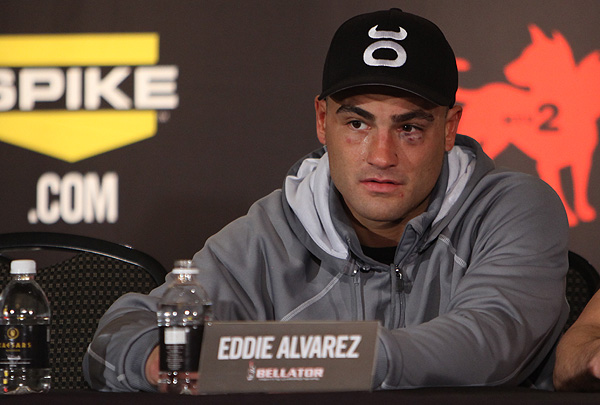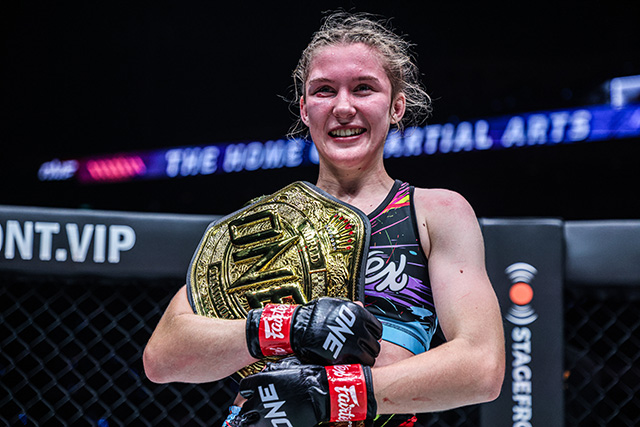When is a Contract Matched? The Crux of the Bellator-Alvarez Dispute

The world of mixed martial arts veered into the legal arena with the contentious contract status of Bellator Fighting Championships lightweight star Eddie Alvarez. A past Bellator champion and one of the promotion’s most recognizable stars, Alvarez recently had his contractual term with Bellator expire and became one of MMA’s most coveted free agents.
Under the terms of his expiring contract with Bellator, Bellator held a 90-day exclusive negotiating period with Alvarez, which kicked in upon the conclusion of his deal on Oct. 12. Following this date, Bellator also retained the right to match any offer for a year following the conclusion of the 90-day negotiating window.
Advertisement
The UFC’s offer to Alvarez contains a multitude of provisions, but it can be boiled down to a few main points regarding compensation and exposure. The UFC offered Alvarez a $250,000 signing bonus, with $85,000 payable after each of Alvarez’s first two fights and $80,000 paid at the completion of his third. Alvarez is being offered an eight-fight deal, starting at $70,000 per fight, with an additional $70,000 per win. These purse amounts increase by $5,000 along the length of the deal, provided Alvarez wins his previous fight. The contract offer also provides Alvarez a share of the UFC’s lucrative pay-per-view revenue. The UFC’s offer to Alvarez entitles him to $1 for every PPV buy between 200,000 and 400,000, $2 for PPV buys between 400,000 and 600,000 and $2.50 for every PPV buy over 600,000. For illustration, if Alvarez fought on a UFC pay-per-view event that garnered 500,000 buys, he would be entitled to a $400,000 bonus under the terms of his contract.
In regards to exposure, the UFC agreed to have Alvarez fight on the
Fox network at least once during the term of the agreement, which
runs for eight fights or 40 months, whichever occurs first.
Additionally, the UFC agreed to use Alvarez no less than three
times as an on-air personality or commentator at UFC events where
he is not fighting. Lastly, the UFC states that it “intends” to
give Alvarez a UFC lightweight title shot in his first fight, by
March 2013, provided that Alvarez and the lightweight champion are
healthy and able to fight.
Upon receiving a copy of the UFC’s offer from Alvarez’s counsel, Bellator claimed to match the offer line by line by simply changing the letterhead on the documents and replacing the UFC’s name with Bellator’s. Additionally, Bellator offered Alvarez an addendum to the contract, outlining three specific compensation points in order to sweeten the pot.
First, Bellator offered Alvarez $25,000 in the first quarter of 2013 for being filmed in a Spike TV “Behind the Scenes” show. Second, Bellator offered Alvarez $100,000 for serving as a coach on the second season of Bellator’s reality series, provided that Alvarez regains his world title. Lastly, Bellator offered Alvarez the opportunity to be a guest host on Spike’s “Road to the Championship” for the Week 9 show of Bellator Season 8. In addition to these three compensation and exposure points, Bellator stipulated that Alvarez’s fights will air live on either Spike TV or pay-per-view and that network will replay Alvarez’s Spike TV fights at least two times after their initial air date. It should be noted that Bellator’s correspondence to Alvarez’s counsel references in a footnote that an inability to reach a timely acceptance on a contract could void the additional compensation points offered in the addendum. Thus, it is unclear if these additional compensation items are still on the table.
Bellator’s lawsuit claims that it has matched -- and exceeded -- the UFC’s offer and seeks a court injunction preventing Alvarez from fighting for an organization other than Bellator. Alvarez’s counsel claims that Bellator has not matched the UFC’s offer because Spike TV is not a suitable substitute for a fight on Fox and that the pay-per-view provision within the UFC’s offer may have been matched on paper but will not be matched in practice. While the UFC and Bellator could air numerous events next year, the UFC’s business model is heavily dependent on pay-per-view revenue; Bellator, meanwhile, has never aired a pay-per-view event. Bellator counters this argument by stating that it has specific plans to air a pay-per-view event in the near future, and that key members of the Bellator organization have experience in putting on such events.
Should this lawsuit be heard on the merits, a court will have to weigh the facts and determine whether either party materially breached the terms of the original agreement. One could argue that since Bellator has not put on any pay-per-view events and that its model is not centered on pay-per-view revenue, its “matching” of the UFC’s pay-per-view revenue clause is not really a match and that Alvarez would stand to earn a considerable amount of more money under the UFC deal. On the other hand, Bellator will claim the UFC’s offer to Alvarez does not contain a guarantee of a UFC fight on pay-per-view, and that it only needs to match compensation terms that are enumerated, not those which are mere possibilities.
It should be noted that there have been instances of courts preventing a fighter from practicing his or her craft due to the provisions of a prior contractual agreement. In the court case of Lewis v. Rahman, 147 F.Supp.2d 225 (S.D.N.Y. 2001), boxer Lennox Lewis sued Hasim Rahman after his knockout loss to Rahman in 2001, claiming their first bout agreement contained an immediate rematch provision. Lewis sought a court order enjoining Rahman from taking a fight other than their contractually stipulated rematch. Rahman contended that his next fight should be against Brian Nielsen after signing a promotional agreement with Don King. The court held that Rahman was bound by the rematch clause of his original agreement with Lewis, and issued an 18-month injunction preventing Rahman from seeking a heavyweight fight with anyone other than Lewis.
Regardless of the court’s outcome, it is important to remember that a court would be very unlikely to order specific performance in the realm of personal service agreements such as a fighter’s contract. This means that while a court could order Alvarez to be contractually bound by his Bellator contract, he would never be actually forced to fight for the promotion. Instead, any violations of the contract would be determined by civil damages. At 29 years of age and in the prime of his athletic career, lengthy and costly litigation could prove to be a difficult foe for Alvarez to beat.
Jeffrey Aris is an attorney at the global law firm Hogan Lovells, and is experienced in matters relating to the business of MMA. This article does not provide legal advice, and any opinions expressed in this article are solely those of the author and do not reflect the views of his law firm. He can be reached at [email protected].
Related Articles







